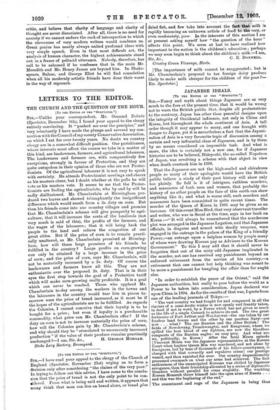LETTERS TO THE EDITOR.
THE CHURCH AND THE QUESTION OF THE HOUR. [To THE EDITOR OP THE "SrzarAmoR.1 Sin,—Unlike your correspondent, Mr. Osmond Dobree (Spectator, December 5th), I found your appeal to the clergy ,entirely convincing. It "pushed me over the precipice," and very reluctantly I have made the plunge and severed my con-
nection with the Council of my county Conservative Association,
on which I sat for over twenty years. No doubt we country clergy are in a somewhat difficult position. Our parishioners, whose interests must affect the course we take in a matter of this kind, are landowners, farmers, and agricultural labourers. The landowners and farmers are, with comparatively few exceptions, strongly in favour of Protection, and they are !quite outspoken in their opinion of those who are not Protec- tionists. Of the agricultural labourer it is not easy to speak with certainty. He attends Protectionist meetings and cheers as his masters cheer, but I doubt whether at the polls he will vote as his masters vote. It seems to me that the Protec- tionists are fooling the agriculturists, who by and by will be sadly disillusioned. Mr. Chamberlain at Birmingham pro- duced two loaves and showed triumphantly the insignificant difference which would result from a 2s. duty on corn. But then his friends come into our country villages and promise that Mr. Chamberlain's scheme will give prosperity to agri- culture; that it will increase the rents of the landlords (not very much is said of this), the profits of the• farmers, and the wages of the labourers ; that it will bring back the people to the land and relieve the congestion of our great cities. But if the price of corn is to remain practi- cally unaltered, as Mr. Chamberlain promised at Birming- ham, how will these large promises of his friends be fulfilled in the country P Large profits on corn-growing can only be attained by a large increase in the price of corn; and the price of corn, says Mr. Chamberlain, will not be materially increased by a 2s. duty. Of course the landowners and farmers know all this. They are not enthusiastic over the proposed 2s. duty. That is in their eyes the first step towards the goal of a Protective tariff which will make corn-growing really profitable. It is a goal which can never be reached. Those who applaud Mr. Chamberlain to-day among the workers in the towns and the labourers in the country would tear him in pieces to- morrow were the price of bread increased, as it must be if the hopes of the agriculturists are to be fulfilled. As regards the Colonies, I cannot conceive that their loyalty is to be bought for a price ; but even if loyalty is a purchasable commodity, what price can Mr. Chamberlain offer? If the duty on corn is not to increase materially the price of corn, how will the Colonies gain by Mr. Chamberlain's scheme, and why should they be "stimulated to enormously increased production" if the value of their produce remains practically unchanged 1)—I am, Sir, &c., H. GEORGE MORGAN. Stoke Lacy Rectory, Bromyard.


























































 Previous page
Previous page